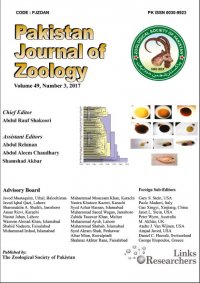Protective Effect of Walnut Oil on Alcoholic Liver Disease in Mice
Protective Effect of Walnut Oil on Alcoholic Liver Disease in Mice
Fujun Miao1, Chunlan Shan2, Wei Yang3, Hao Wang3, Shuxiang Geng1 and Delu Ning1*
ABSTRACT
Walnut oil is widely used in traditional medicine as a dietary supplement for some patients. In this study, the protective effects of walnut oil isolated from Juglans sigllata on livers of alcoholic liver disease (ALD) mice were studied. The results showed that serum alanine aminotransferase (ALT) and aspartate aminotransferase (AST) in the ethanol + walnut oil (ETH + WO) and ETH + silymarin positive group (PC) groups significantly decreased, and the lesions of ethanol-induced liver injury were relieved compared with the ethanol (ETH) group. Walnut oil significantly increased the activities of superoxide dismutase (SOD) and glutathione peroxidase (GSH-Px) in the liver of ALD. Walnut oil exerted the anti-inflammatory effects in the liver of ALD by decreasing the liver index, malondialdehyde (MDA) contents, and the expression levels of F4/80. The expression levels of key factors in the toll-like receptor 4 (TLR4)/nuclear factor-κB (NF-κB) signaling pathway reduced significantly after feeding with walnut oil to the ALD mice. Walnut oil may exert a protective effect on ethanol-induced ALD in mice by inhibiting the TLR4/NF-κB signaling pathway.
To share on other social networks, click on any share button. What are these?









